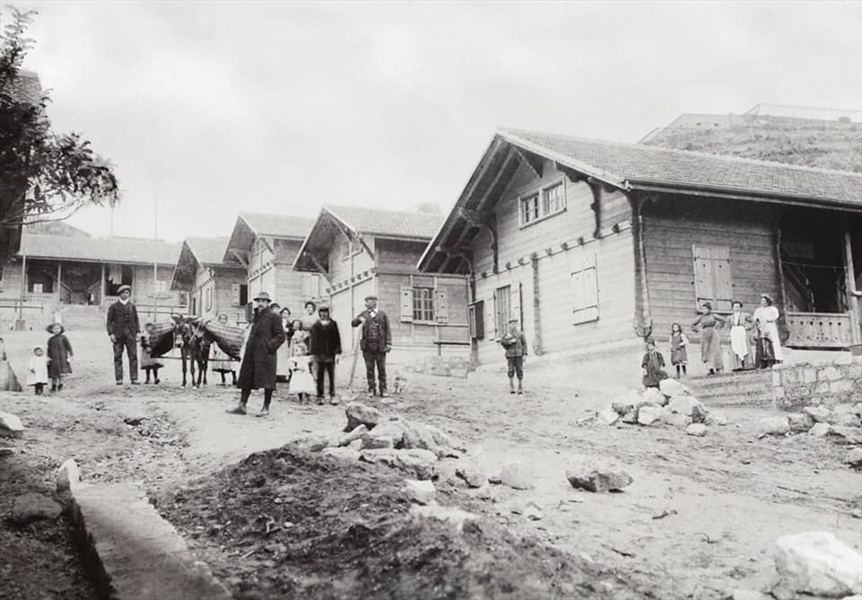
‘Digital museum’ aims to preserve heritage of Swiss Abroad

Over the centuries, Swiss emigrants have left their mark around the world. However, much of this heritage has not been documented. Johann Roduit, a member of the Council of the Swiss Abroad, wants to change this.
Switzerland was once a country of emigration. Between 1850 and 1914, some 400,000 Swiss citizens left their homeland. Most did so in the hope of a better life, to escape poverty in Switzerland. They founded colonies in South America, made wine in Russia and served as mercenaries in foreign wars.
Many Swiss still emigrate each year, whether in search of adventure, for financial reasons, or for love. Today, there are over 800,000 Swiss citizens living abroad, including the descendants of former emigrants.
And they have left their mark in many of the places where they settled. This heritage is however in danger of being lost; often it was never even known about in the first place. Johann Roduit, who represents Western Canada on the Council of the Swiss Abroad, wants to change this.
At the Congress of the Swiss Abroad in St Gallen this weekend, he is thus presenting an initiative to safeguard the cultural legacy of the Swiss diaspora.
Lack of colonial legacy
Roduit is convinced that Switzerland’s historical heritage does not stop at the country’s borders. “Wherever there are Swiss people, they create Swiss culture,” he says. He believes that preserving and promoting this cultural heritage will enrich Swiss identity.
If you look for traces of Swiss presence abroad, you can find them in place names such as Bern, Lucerne and New Glarus – all villages in the US that were founded by Swiss emigrants. Or in Sri Lanka, where the Swiss building of the Baurs company still stands proud in the middle of the capital, Colombo – a legacy of Alfred Baur, who laid the foundations of his fortune with a coconut plantation in what was then Ceylon. Or in Golden, a town of chalets in the Canadian Rockies, where the famous Swiss mountain guides once lived.
Why does this heritage draw so little interest in Switzerland itself? “Perhaps we never thought there could be such a legacy, as we don’t have a colonial past,” says Roduit. But this is just a hunch, he says. For concrete answers, “you would have to ask the experts”: that is, from groups such as the Swiss Heritage Society, Pro Helvetia and the Federal Office of Culture.
Roduit is concerned about preserving not just material heritage, but also the intangible traces left by Swiss in the world, for instance in the area of mountaineering. “Unfortunately, we don’t know enough about our history and influence abroad,” laments the Canadian delegate, who recently coordinated a successful operation to rescue a relic of Swiss cultural heritage (see below).

More
Chalet stay or chalet go? Preserving Swiss heritage in Canada
Preserving culture by mobile phone
Roduit’s solution to bridge this gap is to create a digital museum. “Swiss people abroad will be able to document cultural assets around the world directly with their mobile phones,” he says.
He also already has a prototype for his vision. In cooperation with the Engineering and Architecture faculty at the University of Applied Sciences Western Switzerland, Roduit has developed a concept that could be implemented “pretty quickly”. It is based on a web app that can be used to both collect data and to present content attractively. The big advantage of this digital museum is the cost: “there is no rent to be paid, no building to maintain”, Roduit says. The only expenses would be for personnel, such as programmers or curators.
However, the digital museum of Swiss history abroad is not yet a done deal. “We must first see if there is any interest in Switzerland,” says Roduit. If there is – and he hopes for positive feedback at the Congress of the Swiss Abroad – work can then start on documenting the historical heritage left by the Swiss around the world. And with money needed to implement the project, “the next step would then be fundraising,” Roduit says.
Translated from German by Julia Bassam
More

In compliance with the JTI standards
More: SWI swissinfo.ch certified by the Journalism Trust Initiative
































You can find an overview of ongoing debates with our journalists here . Please join us!
If you want to start a conversation about a topic raised in this article or want to report factual errors, email us at english@swissinfo.ch.